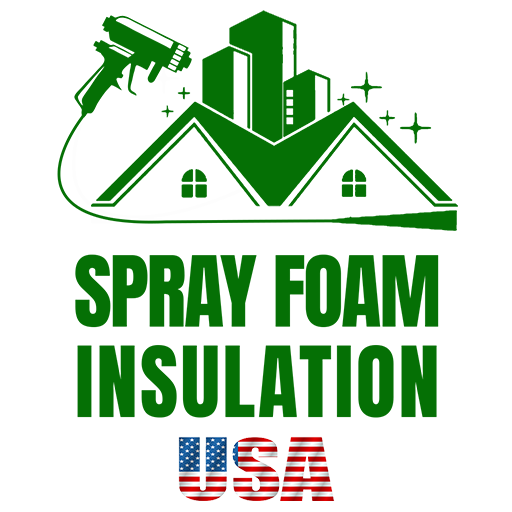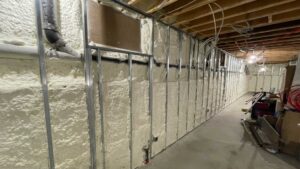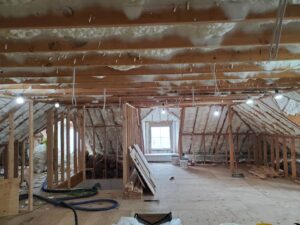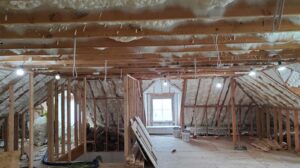Understanding Soundproofing and the Importance of Quality Insulation
Soundproofing isn’t rocket science, it’s all about putting up barriers to block or absorb sound. Think of it like this: you’re in a room and you want to keep out the noise or maybe keep your own noise from bothering your neighbors. Good insulation is your best friend here—it’s the padding between you and the racket. High-quality insulation snatches up the sound waves, swallowing them before they can bug anyone. It’s not just any old material, though. To really mute the outside world, you need stuff like dense foam or thick fiberglass. These tough actors put up a real fight against noise. Now, the thicker and denser your insulation, the less noise you’ll deal with. So, don’t skimp on quality. Sure, it might cost you a bit more upfront, but think about the sweet sound of silence you’ll get in return. That’s worth its weight in gold.
Common Types of Quality Insulation for Soundproofing
When it comes to soundproofing, picking the right insulation is key to turning down the volume. Let’s dive into the common types that get the job done. First up, we’ve got Fiberglass Insulation—it’s the go-to for many because it’s affordable and effective at damping sound. Plus, it’s pretty easy to install. Next is Rockwool Insulation, a heavyweight champ that’s denser than fiberglass, making it great at blocking noise. It also boasts a high fire resistance, which is an excellent safety perk. Then there’s Acoustic Foam Panels. These babies are designed to absorb sound, and they can be placed on walls to nix echo and reverberation. Last but not least, we’ve got Sprayed Foam Insulation, which expands to fill nooks and crannies, cutting down on sound leaks. So, whether you’re building a music studio or just want to enjoy some peace and quiet at home, these materials can help you achieve a soundproof sanctuary.
How Quality Insulation Works to Block Sound
Quality insulation is like a superhero for your walls, fighting off those pesky sound waves that try to invade your peaceful space. It works by putting up a strong barrier that absorbs and disrupts the pathway of sound. Think of it as a thick, dense forest where sound gets lost among the trees instead of a clear, open field where it can race straight to your ears. Insulation materials such as fiberglass, rock wool, and foam panels are the trees in this forest, with their intricate structures trapping and scattering sound, reducing the noise that gets through. The denser the material, the better it is at playing defence against unwanted noise. So, good insulation doesn’t just keep your energy bills down—it also keeps the peace and quiet in.
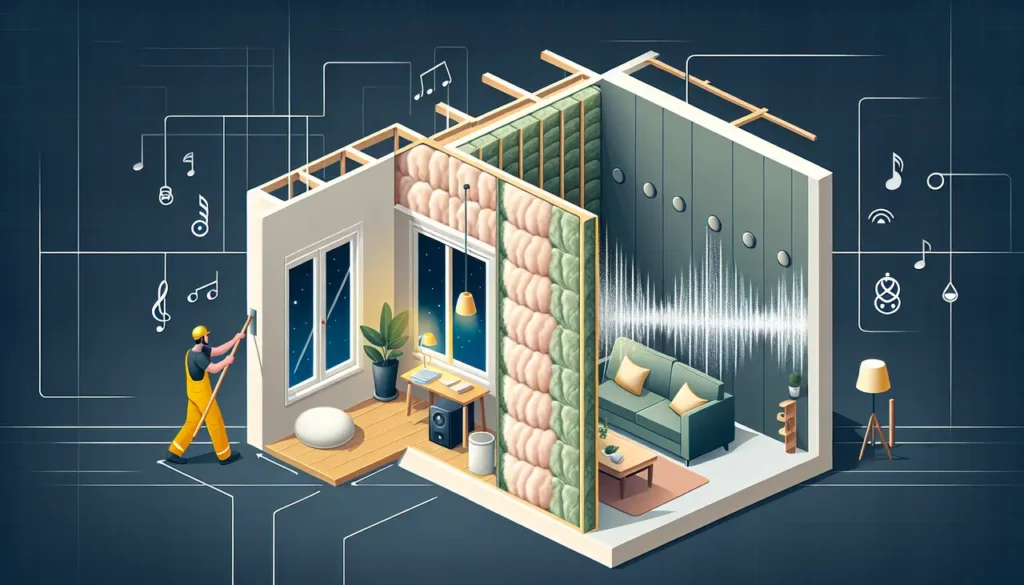
The Benefits of Investing in Quality Insulation for Noise Reduction
Quality insulation isn’t just for keeping your home warm; it’s a soundproofing champion too. When you invest in good insulation, you’re signing up for peace and quiet. This stuff keeps the racket out and the calm in, acting like a mighty barrier between you and the noisy world. Proper insulation means you won’t be bothered by the sound of traffic, loud neighbors, or that barking dog next door. And it’s not only about less noise; it also means clearer sound inside, whether you’re enjoying music or watching a movie. So, by choosing quality insulation, you’re boosting your comfort big time. It does good for your energy bills too, thanks to top-notch temperature control. In short, spending a bit more on quality insulation for noise reduction is a smart move that pays off by giving you a quieter and more comfy home.
Factors to Consider When Choosing Soundproof Insulation
When picking insulation for a soundproof space, focus on the material’s Sound Transmission Class (STC) rating. Higher STC numbers mean better sound blockage. Consider the insulation’s thickness; thicker materials tend to absorb sound better. Don’t forget about the density, as dense materials can dampen sound more effectively. Also, check if the insulation is designed specifically for soundproofing, not just thermal purposes. Lastly, consider the installation process and ensure it’s done right to avoid gaps that can let sound through. Your room’s tranquility may hinge on choosing the right insulation and installing it correctly.
Installation Tips for Maximizing the Efficiency of Quality Insulation
First off, let’s chat about getting that insulation in right. If you want a pad that’s serene and hushed, sorting your insulation is key. Check this—get a pro for the job. They know their stuff, and they’ll slip in that insulation snug and proper. Now, if you’re going DIY, take note. Make sure the insulation fills the whole space, no gaps or crinkles. This is crucial; any slip-ups and noise leaks in.
Another thing—seal it tight. Use sealants or foam for closing up those pesky cracks and seams. This wrangles in the sound, keeping your space nice and quiet. And hey, one more nugget of wisdom—think layers. More layers mean better soundproofing. So, stack up the insulation, and you’ll notice a big difference. Remember, it’s not just slapping in material; it’s about precise placement and sealing the deal for that pure silence.
The Role of Insulation Thickness and Density in Soundproofing
When you’re dealing with noise, thicker and denser insulation acts like a barrier that keeps the racket out. Think of it like a superhero’s shield against the villainous sounds of the world. The thicker the insulation, the better it muffles the noise trying to invade your space. It’s not just about thickness though – density is a heavy hitter in this fight. Dense insulation is like having a battalion; it packs a punch by trapping sound waves and stopping them from bouncing around. So, a combo of both – a thick and dense insulation, is your best bet for turning your home into a peaceful fortress. Keep in mind that there’s a balance to strike. You want enough insulation to block the noise, but too much can hit your wallet hard and take up more space than you can afford to give. When you pick out insulation, think about the type of noise you’re up against and choose armor that’s just right to keep your peace and quiet safe.
Additional Soundproofing Materials to Use with Quality Insulation
When you’re beefing up your space to block out noise, quality insulation is key but don’t stop there. Add more muscle to your soundproof fortress with these handy materials. Use mass-loaded vinyl, a dense rubber-like sheet, on walls, ceilings, and floors to dampen vibrations. Tack on soundproofing foam panels; their uneven surfaces gobble up sound, making them great for echo-prone areas. Acoustic sealants are superheroes, swooping in to seal gaps and cracks where noise loves to sneak in. And let’s not forget about soundproof curtains or blankets; these aren’t just for late sleepers but can be hung over doors or windows to thicken your noise barrier. Layer up these materials with insulation for a quieter room.
Maintenance and Longevity of Soundproof Insulation
Soundproofing your space is an investment, one you want to last. Good quality insulation won’t demand much upkeep, but you need to check it now and then for wear and tear, dampness, and any pest infestation. Insulation like spray foam usually requires less maintenance because it’s less prone to these issues. If you do find problems, it’s crucial to tackle them quickly to make sure your soundproofing stays effective. Well-maintained soundproof insulation can serve you for decades, keeping the peace and quiet uninterrupted. Remember, longevity depends not only on the quality of materials used but also on proper installation and timely repairs.
Summarizing the Impact of Quality Insulation on a Soundproof Space
Quality insulation is key in crafting a soundproof area. It’s not just about keeping your home cozy, it’s about blocking noise from coming in or out. Good insulation cuts down on the racket from outside and keeps your private conversations inside. Insulation materials like fiberglass, foam, and dense mineral wool are champions in this fight against noise. For instance, dense mineral wool isn’t just a great sound blocker; it’s fire-resistant too. Whereas, special acoustic foams are designed to soak up sound, making your space quieter. You see, it’s all in the material’s density and how it’s installed that determines how quiet your room will be. In short, choose the right insulation and install it properly, and you’ll turn your space into a peaceful haven.
Ready to save energy, improve air quality, and reduce costs?
Contact Spray Foam Insulation USA today for a free estimate. Get a cost-effective, eco-friendly insulation solution that enhances comfort and lowers environmental impact.

